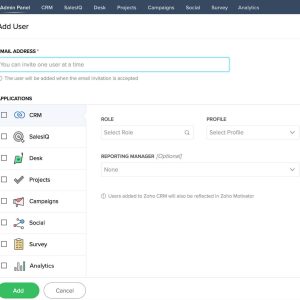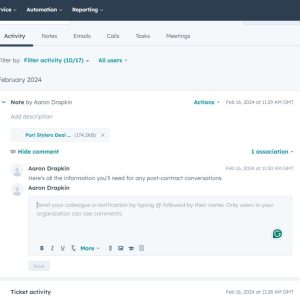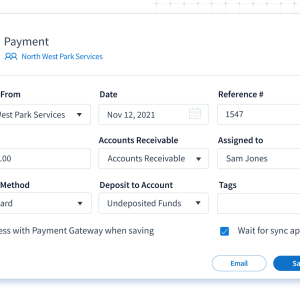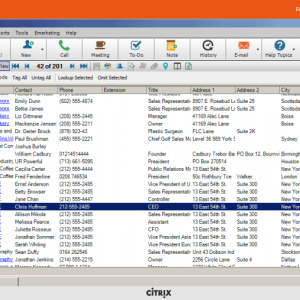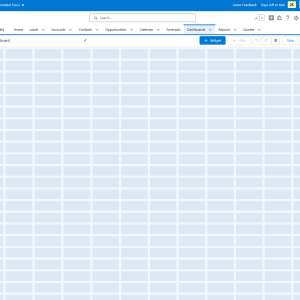In the fast-paced world of business, organizations are constantly seeking ways to streamline their processes and improve efficiency. One key tool that has become essential for managing customer relationships is a Customer Relationship Management (CRM) platform. When integrated with accounting software like Xero, businesses can gain valuable insights into their customers, finances, and overall operations. In this article, we will explore the 5 best CRM platforms with Xero integration in 2024, highlighting their features and benefits for businesses looking to optimize their workflow and drive growth.
The best CRM platform that offers Xero integration is Zoho CRM. Zoho has a range of useful features for managing leads and tickets, as well as multiple available Xero add-ons and integrations for its bidirectional sync with the accounting software. What’s more, Zoho’s plans sit at the more affordable end of the market, and there’s also a decent free offering for small businesses with less than four employees.
You are viewing: 5 Best CRM Platforms with Xero Integration in 2024
For small and scaling businesses, CRM software is no longer “nice to have”. Instead, it’s an essential tool for keeping on top of your customer relationships, nurturing new ones, and streamlining your operations – meaning you can free up more of your team’s time to focus on the interactions that matter to your business.
By combining a CRM with Xero, all of your financial data will be on hand at all times, whatever aspect of the customer journey you’re at – all the way from cold outreach to automatic invoice chasing. That’s why we’ve put together a list of our favorite CRM solutions that integrate with Xero.
Best CRM Systems with Xero Integration: Reviews
You can see that our preferred choice for small businesses is Zoho CRM, but there are several options on the market with their respective strengths and weaknesses. Read on for a full breakdown of some of them.
Zoho CRM
- Best for: Overall
- Price from: $14 per user, per month, when billed annually
Not only is Zoho CRM our pick of the platforms with Xero integration, it also scored the highest rating in our review of the best CRM platforms for small businesses. Simply put, we’re big fans of it over here at Wubeedu.
Through its integration with Xero, Zoho CRM provides speedy access to your customers’ financial data. Users can create, cancel, and download and export invoices all from within the Zoho platform, in addition to syncing accounts, contacts, products, purchase orders, and payments and reconciliation statuses.
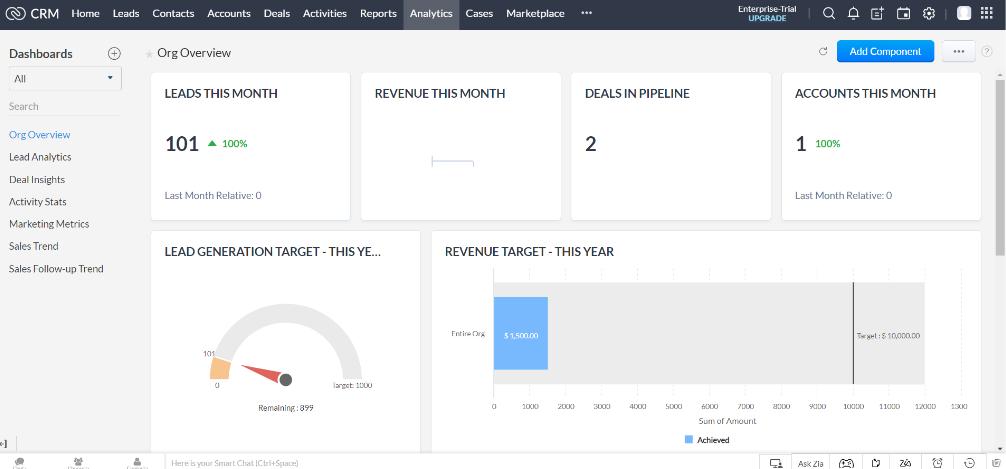
Zoho CRM will let you build dashboards displaying all of your deal progress data. Source: Wubeedu testing
This range of available record syncs is what sets it apart from the competition – other options on the market simply do not provide the same level of flexibility.
Not only this, but Zoho CRM customers can access a range of different Xero integrations and add-ons. For example, Professional plan subscribers ($23 per user, per month, billed annually) are automatically granted access to Zoho Expense, a powerful expenses tool that lets users sync their everyday expenses directly to their Xero account (and the best platform for customization in our review of the best expense management software).
You also have the option of integrating Zoho and Xero through third-party apps, including Zoho Xero Connector (ZOX) and Zoho2Xero. These plug-ins provide an alternative for users that want to explore their options.
Pricing
In addition to its decent free plan, Zoho CRM is one of the more affordable platforms out there, with pricing starting at $14 per user, per month, when billed annually, and going up to $52 per user, per month, when billed annually. Its Xero integration will cost $15 per organization, per month or $165.60 for a year. Find a full breakdown of Zoho CRM plans below:
- Standard – $14 per user, per month, when billed annually
- Professional – $23 per user, per month, when billed annually
- Enterprise – $40 per user, per month, when billed annually
- Ultimate – $52 per user, per month, when billed annually
HubSpot CRM
- Best for: Expense management, free plan
- Price from: $15 per user, per month, when billed annually
Another of our favorite CRM platforms, HubSpot earns a place on this list for its free plan, which offers free Xero integration, and its mighty expense and revenue management tools.
If you decide to integrate HubSpot CRM with Xero, and subscribe to Xero’s Established plan ($80 per month), you’ll be able to tap into some robust expense management features. While it might not be welcome news to businesses on a budget, it’s a great opportunity for organizations that do a lot of expense reimbursement, such as businesses with many client-facing employees.

Creating contacts in HubSpot is easy, and there are loads of places to store important data. Source: Wubeedu. Source: Wubeedu testing
See more : Zendesk Sell Review – Is the Sales CRM Worth It?
Added to this, thanks to HubSpot CRM’s all-in-one sales, marketing, and customer service package, businesses that choose to integrate with Xero will get access to advanced sales, expense, and revenue tracking functions. Among them, you’ll be able to easily send invoices, enter bills, reconcile transactions, and capture receipts.
Pricing
For all its merits, HubSpot is quite an expensive service. Plans start at $15 per user, per month, when billed annually, and go all the way up to $150 per user, per month, when billed annually.
- Sales Hub Starter – $15 per user, per month, when billed annually
- Starter Customer Platform – $15 per user, per month, when billed annually
- Sales Hub Professional – $90 per user, per month, when billed annually
- Sales Hub Enterprise – $150 per user, per month, when billed annually
Salesforce Sales Cloud
- Best for: Advanced accounting, larger businesses
- Price from: $25 per user, per month, when billed annually
Another name that needs no introduction, Salesforce integrates with Xero to create a powerful CRM and accounting hybrid. For larger businesses that need advanced features, it’s definitely worth looking into. If your software budget is tight, there are better value options elsewhere – only Pro Suite plan subscribers ($100 per user, per month, when billed annually) can get the benefits of Xero.
If you do opt for it, you’ll get your hands on some sophisticated reporting, analytics, and customization options, which means that teams can seamlessly handle various currencies and workflows. Alongside this, you’ll be able to create, send, and manage invoices, with several available Xero integrations to choose from.

We were able to easily create sales forecasts that projected our potential earnings. Source: Wubeedu testing
There is, however, no free plan, which is disappointing. Subscribers to the HubSpot free plan can get the benefits of Xero, but Salesforce customers will have to open their wallets.
Pricing
Salesforce Sales Cloud isn’t cheap. There are five paid tiers to choose from, divided into SMB plans and enterprise plans, starting at $25 per user, per month, when billed annually, and going up to a whopping $500 per user, per month, when billed annually. See the full breakdown below.
SMB plans:
- Starter Suite – $25 per user, per month, when billed annually
- Pro Suite – $100 per user, per month, when billed annually
- Enterprise – $165 per user, per month, when billed annually
Enterprise plans:
- Unlimited – $330 per user, per month, when billed annually
- Einstein 1 Sales – $500 per user, per month, when billed annually
Capsule CRM
- Best for: Invoice management
- Price from: $18 per user, per month, when billed annually
Capsule CRM is a well-thought-of CRM solution geared towards businesses of up 1,000 employees. Its Xero integration is quite limited compared to other offerings on the market, but it makes up for it with an excellent ability to handle supplier information and invoices. What’s more, it has a free plan, and subscribers can access the Xero integration via the third-party apps platform, Zapier.
The Xero integration is very user-friendly, allowing users to add customers and suppliers directly to Xero, all from the Capsule interface. These records sync automatically, meaning that you’ll only have to update information in one place.
As mentioned, however, the integration isn’t particularly feature-rich. There’s no option to manage multiple accounts across multiple branches, for instance, which is one area that Zoho excels in.
Pricing
Capsule’s pricing represents pretty good value for money. Its paid plans start at $18 per user, per month, when billed annually, going up to just $72 per user, per month, when billed annually.
- Starter – $18 per user, per month, when billed annually
- Growth – $36 per user, per month, when billed annually
- Advanced – $54 per user, per month, when billed annually
- Ultimate – $72 per user, per month, when billed annually
Pipedrive
Pipedrive is a dedicated small business solution with sales teams in mind. While its functionality is pretty standard compared to its rivals, it does offer great security features. The platform also integrates with Xero. If you’re in the market for an integration that emphasizes multistep workflows and progressive billing, you’re in luck – this is where Pipedrive has an edge over the other providers on this list.

Viewing insights within the Pipedrive dashboard. Source: Pipedrive
By pairing one with the other, you can generate invoices based on your existing Pipedrive data and sync sales information between the two platforms, saving time and removing human error from the equation. And with Xero Advanced Automation, you’ll be able to tap into some pretty advanced accounting functions, including sales and receivables tracking.
Pricing
Like Salesforce, Pipedrive has no free plan. It does, however, have five pretty reasonable plans to choose from, starting at $14 per user, per month, when billed annually. Its Enterprise plan will set you back $99 per user, per month, when billed annually.
- Essential – $14 per user, per month, when billed annually
- Advanced – $34 per user, per month, when billed annually
- Professional – $49 per user, per month, when billed annually
- Power – $64 per user, per month, when billed annually
- Enterprise – $99 per user, per month, when billed annually
What Are the Benefits of Integrating Your CRM with Xero?
Integrating your CRM solution with Xero will unlock a series of great perks to boost your business. We’ve outlined some of our picks below.
Better accuracy
See more : Zoho CRM vs HubSpot – Price and Features Comparison
When it comes to inputting vast amounts of data, human error is one of the biggest business headaches around. By integrating your CRM with Xero, you can automatically sync your customer data with your financial data, and vice versa, meaning the margin for error is much lower.
By only having to input data on one platform, you’ll have more time to make sure that you’ve typed it out properly – and this means you can go into stakeholder meetings safe in the knowledge that your numbers are correct.
Increased efficiency
By greatly reducing the time you’ll have to spend manually inputting accounting data into your CRM system, you’ll free up space to focus on more important tasks, such as serving your customer base. Ultimately, your customers will appreciate the extra time you’ll have spare for them – and that builds loyalty.
Better decision-making
Being able to access all of your customer and/or client financial information from within your CRM means you and the rest of your team can quickly make informed decisions on what to prioritize without them having to trawl through reams and reams of data, so making decisions becomes much easier.
How We Evaluate CRM Systems with Xero Integration at Wubeedu
We take our impartial research and analysis seriously, so you can have complete confidence that we’re giving you the clearest, most useful recommendations.
After conducting an initial exploration to identify the most relevant, popular, and established CRM tools in the market, we put them through their paces to find out more about their strengths and weaknesses. In total, we analyzed 13 CRM systems, grading them across 84 areas of investigation.
Based on years of market research and CRM product testing, we’ve established a CRM research methodology to score products, which consists of six main assessment categories and 13 subcategories. This covers everything from the available features and scalability capacity to the product’s value for money and much more.
For this article specifically, we took into account both the results from our most recent CRM research series and the capabilities of each provider’s Xero integration.
Our main testing categories for CRM systems are:
Features: The functionalities and capabilities provided by the CRM software, such as contact management, lead and opportunity tracking, and task and activity management.
Help and Support: The resources and assistance available to users when they encounter issues or require guidance while using the CRM software.
Customization: The ability to tailor the CRM software to suit the specific needs and processes of the organization, e.g. customizing fields, layouts, and workflows.
Scalability: The ability of the CRM software to accommodate the growth and changing needs of the organization, such as the capacity to handle a growing customer database.
Price: The cost associated with using the CRM software. It includes factors such as licensing fees, subscription plans, and additional charges for add-on modules or features.
Team Structure – Sales CRM: Determining if a platform makes it easier to manage large sales teams, including team dashboards, team hierarchies, and team inboxes.
Usability – Small Business CRM: Assessing the simplicity of the interface, the ease of navigating through menus and options, and the overall user experience.
When it comes to calculating a product’s final score, not all testing areas are weighted evenly, as we know some aspects matter more to our readers than others, which are merely “nice to have.” After hundreds of hours, our process is complete, and the results should ensure you can find the best solution for your needs.
At Wubeedu, we have a number of full-time in-house researchers, who re-run this testing process regularly, to ensure our results remain reflective of the present day.
Learn more about our research.
That’s a wrap on “ 5 Best CRM Platforms with Xero Integration in 2024 ” We hope you’ve found a trove of useful insights and fresh perspectives. Your opinions and ideas matter to us—join the conversation below and share your take! Hungry for more tech insights? Dive into our diverse collection of articles where innovation meets practicality. Discover More CRM Softwares.
Stay in the loop with the latest in AI and tech – your journey into the digital future continues at wubeedu.com.
#CRM #Platforms #Xero #Integration
Source: https://wubeedu.com
Category: CRM
